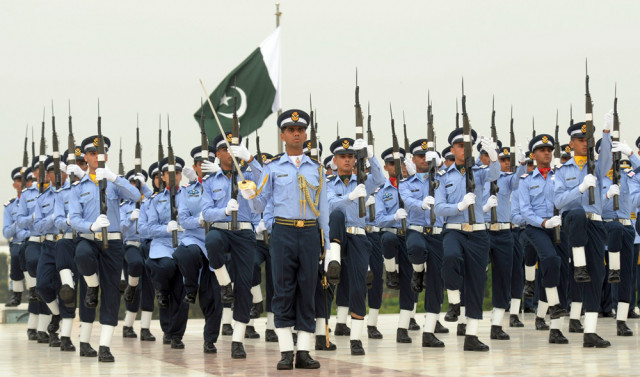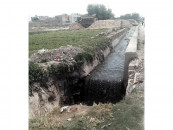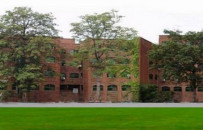Day of action against military spending: ‘Prioritise development over military budget’
Speakers at forum call for cuts, transparency in defence spending.

Pakistanis should not consider discussions on lowering defence spending to have “anti-state” motivations, as military spending comes at the cost of much needed development spending in the country.
This was the dominant view of speakers at a discussion forum organised by the South Asia Partnership Pakistan (SAP-Pak) titled ‘From a security state to a welfare state: analysing the defence budget’ here on Tuesday, which was the Global Day of Action Against Military Spending.
Dr Abdul Hameed Nayyar, a visiting professor at the LUMS School of Science and Engineering, asked how Pakistan could convince the world that its nuclear weapons were safe when militants had attacked ‘secure’ areas like the General Headquarters in Rawalpindi, the Mehran Naval Base in Karachi and, most recently, a jail in Bannu.
“In the midst of growing terrorism in the country where no place is safe, how do we respond to the world’s concern over the security of our nuclear arsenal?” he asked.
Dr Nayyar said that discussions about lowering defence spending were often labelled as “anti-state”. Referring to Ayesha Siddiqa’s book Military Inc: Inside Pakistan’s Military Economy, he said that a military industrial complex had been established in the country that prioritised defence expenditure over development expenditure.
He said that the weapons industry constituted the largest business in the world, one dependant on the sale of arms and ammunition. “Once this happens [an arms industry is established] within a state, it requires enemies,” he said. “If it does not have enemies it goes on to create enemies. Unfortunately this narrative has been built into our mindsets.”
Dr Nayyar said this narrative was supported by textbooks which identified “certain states” as enemies. “This goes on to reinforce the concept of [other states as] enemies and hatred in the young,” he said.
He called for a transparent defence budget, saying it was unclear exactly where and how that budget was spent. The nuclear budget, he said, was completely hidden.
“We are told that these are strategic state assets for which the budget cannot be disclosed,” he said. He added that citizens should demand to know how and where the state was spending the budget.
Irfan Mufti, the deputy director of SAP-Pakistan, said the discussion aimed to elucidate the consequences of military spending for the economy and its eventual impact on citizens. He said the state was investing heavily in defence while depriving people of basic amenities.
Advocating global disarmament, Mufti said that the entire world’s defence spending amounted to $1.62 trillion (Rs146.945 trillion), out of which 43 per cent was spent by the United States. Pakistan spent about 2.8 per cent of its GDP on defence. He said that the day was being celebrated with events in more than 30 cities in Pakistan, which was “a positive indicator of the public’s interest in such affairs”. Salman Abid, the regional head of the Strengthening Participatory Organisation (SPO), said there was a disconnect between the needs of the people and the budget allocated by the state. He said taxation was “very unfair” and accommodated the interests of the rich few. He urged the government to reconsider its priorities, as “security expenditure is made by cuts from the development budget”.
“We do not need nuclear bombs, we need food and shelter,” said Rubina Jameel, a women’s rights and trade union activist. She said successive army takeovers of government had led to an increase in military spending.
She said there was a dire need to work towards better ties with neighbouring countries. “If we ensure peaceful co-existence, there will be no need for such high military spending,” she said.
Awami Party Pakistan General Secretary Professor Jameel Umar said that if Pakistan wanted to become a welfare state, it had to give up the idea of becoming a security state. He said that fighting over natural resources had caused an escalating arms race in the world.
“The world’s natural resources, if collectively distributed, are enough to address the needs of the entire world’s people,” he said. “But then the more pressing question is how to address the urge of certain countries to take over the natural resources of others.”
Published in The Express Tribune, April 18th, 2012.



















COMMENTS
Comments are moderated and generally will be posted if they are on-topic and not abusive.
For more information, please see our Comments FAQ